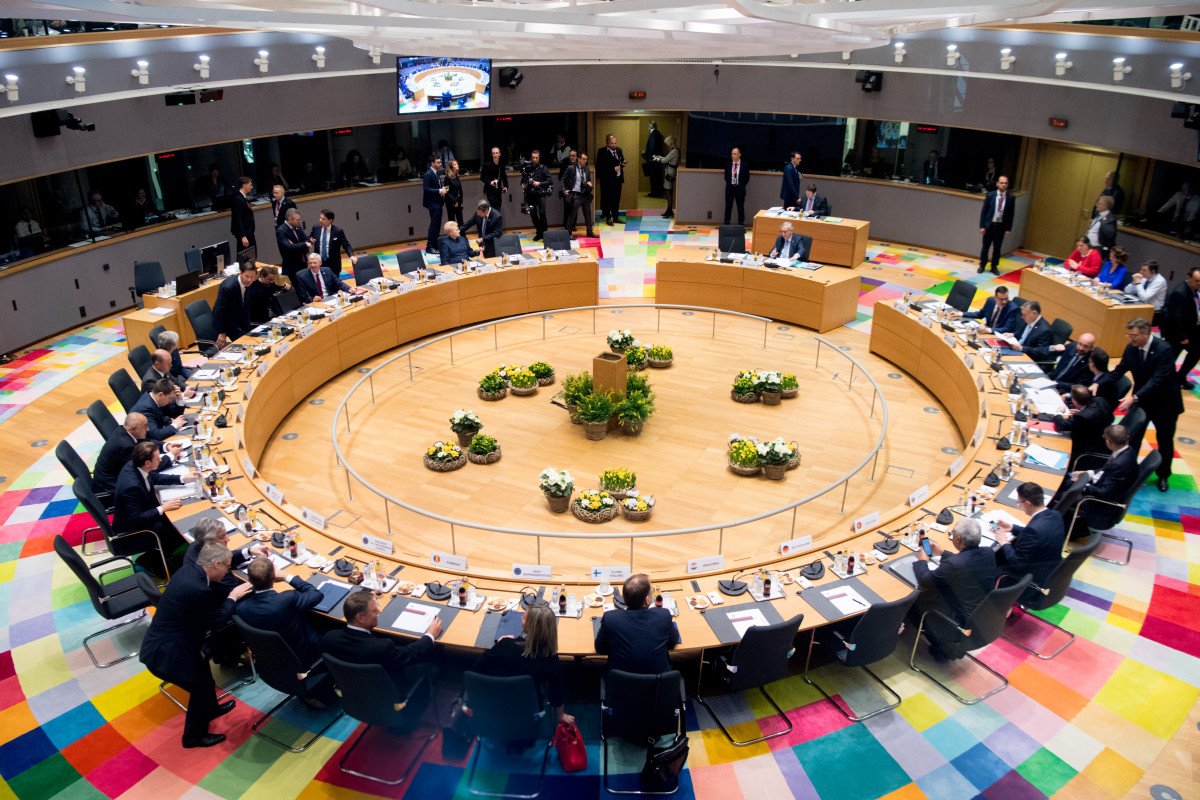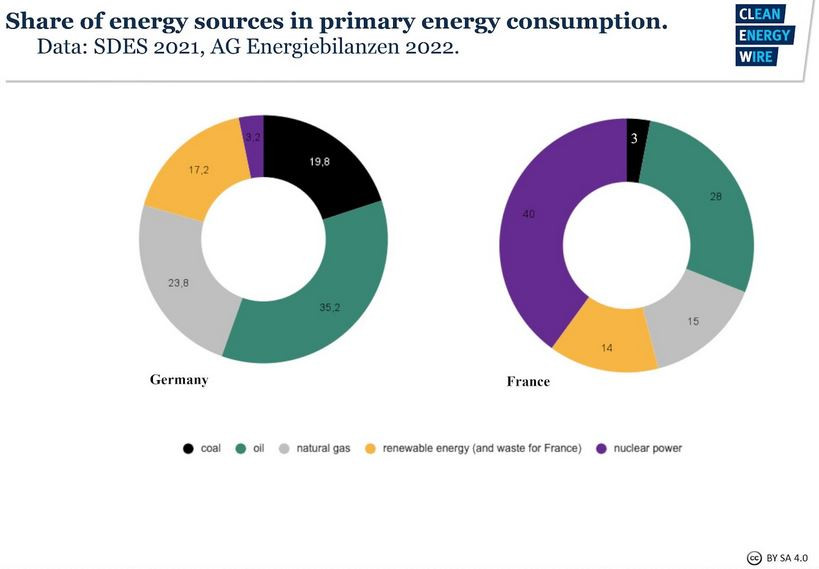France and Germany claim EU deal on electricity market a success despite unresolved nuclear questions
France and Germany claim an agreement by EU states on reforming the bloc’s electricity market is a reward for national efforts to put a check on each other’s demands in the energy sector. Following months of heated debates about the reform of the power market’s design, the EU energy council on Tuesday (17 October) reached an agreement designed to shield electricity prices from fossil fuel price hikes, particularly regarding natural gas. The agreement also included a deal on the role of nuclear power, a major point of disagreement between Paris and Berlin that held up the agreement for months, as their views on the technology’s future are fundamentally opposed. The French government ultimately achieved an inclusion of nuclear power in climate-friendly investment structures, but industry representatives and policymakers from Germany insisted that concessions for the technology could still be amended in the remaining legislative procedure.
“This is good news for the [power] bills of French people,” France’s energy minister Agnes Pannier-Runacher said in an interview with radio station France Info. The reform agreed by EU energy ministers at their meeting in Luxembourg means that “European customers will pay the average production price” for electricity, rather than shouldering the costs of price fluctuations on fossil fuel markets, Pannier-Runacher said.
Germany’s energy minister Robert Habeck said the agreement had shown “Europe’s ability to act” on urgent matters for citizens and guarantee access to affordable electricity prices for households and industry. Germany had successfully brokered “fair competition on Europe’s power market” and consumers could now “benefit from the low production costs of non-fossil energy sources,” Habeck said in a ministry statement.
Representing the Spanish EU Council presidency, Spain’s ecological transition minister Teresa Ribera said reaching such an agreement would have been “unimaginable only a couple of years ago.” The reform will not only benefit consumers financially, but also propel the expansion of clean energy sources, she said. The Council presidency will now lead negotiations with the European Parliament for adopting the proposed reform.
Caused by the market’s merit-order-principle, gas often determines power prices in Europe, as the most expensive form of power generation sets the rate for all other producers. France had advocated for a reform already since 2021. The negative effects of the existing system became apparent during the energy crisis in 2022. An extreme spike in the cost of natural gas caused a rise in overall power costs due to gas-fired power plants determining market rates for electricity.
The reform proposed by the European Commission in spring this year includes the introduction of long-term contracts that are supposed to shield industry and households from short-term spikes like those caused by Russia’s war on Ukraine. The member state representatives agreed that so-called contracts for difference (CfDs) should become the only permissible government support mechanism for new power generation installations in the future. If market prices are above production costs, producers must pass on the difference to the state, which will use the funds to relieve customers. If they are lower, the state will compensate producers. “The gas price may rise, but it will only account for a small fraction of the bill,” Pannier-Runacher said.
Technologies eligible for support included wind, solar, hydro, geothermal, and nuclear power. Crucially for France, the agreement also includes funding of existing installations with proceeds from CfDs, provided these investments go into retrofitting, runtime extensions or capacity increases. At the same time, the EU Commission under the agreement is tasked with ensuring that CfDs are not distorting competition. In the framework of EU capacity mechanisms, coal and gas-fired power plants that emit more than allowed under the current emissions standard would also be eligible for support until the end of 2028. These plants so far are slated to go offline by 2025, but Poland’s government insisted on an extension.
German energy industry and policymakers insist further changes to deal are needed
German renewable power industry lobby group BEE welcomed aspects of the deal on energy sharing among European states but said the Council agreement failed to meet expectations and “partly contained decisions that seem to come from a different time.” BEE chairwoman Simone Peter said supporting coal and nuclear “are diametrically” opposed to expanding renewable power sources. She said backing coal and nuclear power will ultimately hinder achieving “a resilient, clean, and permanently affordable energy supply.” The so-called trilogue negotiations between the EU’s key institutions – the Council, the Commission and the European Parliament – must introduce major amendments to the current proposal, Peter argued. The decision on CfDs is “clearly rejected” by the BEE, she added, arguing that other support mechanisms should not be given up instead. Retroactively altering existing mechanisms into CfDs would be unacceptable, Peter said.
Energy industry association BDEW welcomed the energy minister’s consensus as “an important step” for strengthening Europe’s internal energy market that is acceptable for both France and Germany. BDEW head Kerstin Andreae argued the right to apply CfDs to existing power plants “should be limited to clearly defined cases” and guided by clear state support principles. The Commission had to make sure that trade and competition distortions are not permitted in Europe’s energy market. Andreae also said that the trilogue negotiations had to bring further “constructive” solutions.
Michael Bloss, member of the EU Parliament for the German Green Party said the deal represented a much-needed success that would pave the way for further negotiations in the parliament. However, he stressed that “the Council cannot move on without the parliament.” The focus in further proceedings must be put on expanding renewables and protecting consumers from price hikes, he argued. “New subsidies for coal or a special treatment of nuclear power are out of the question.” Freeing nuclear plants from market exposure in the proposed way would be “inefficient and un-European,” Bloss said, adding that the European Parliament “will demand improvements.” Fair competition would mean that renewables ultimately prevail, he insisted, adding that “loopholes” for old nuclear plants in France and coal plants in Poland could not be accepted. “These energy sources are a thing of the past.”
The French energy minister hailed the deal as a success, given Germany’s “reluctance” to accept the technology as an asset in EU climate action. Pannier-Runacher argued that nuclear power, France’s most important source of electricity, had come out as a major winner of the deal: “Today, the funding of future nuclear power capacity, as well as that of existing plants and their runtime extension, has been guaranteed.” Investors could now be reassured that the state will guarantee predictable returns, she said. At the same time, the minister insisted the agreement would not push renewables expansion in France to the sidelines. “We want to massively invest in nuclear and renewable power.”
Both France and Germany have repeatedly stressed they are looking for ways to shield European companies from high energy prices and make them more competitive vis-à-vis industrial competitors in China or the U.S., who benefit greatly from support schemes. French president Emmanuel Macron and German chancellor Olaf Scholz shortly before the EU energy council meeting had vowed that both countries are ready to agree on a reform, shrugging off the obstacle posed by the nuclear dispute. However, the German government had repeatedly opposed including nuclear power into the reform, citing the technology’s unresolved technical and environmental challenges, as well as concerns that the French government could use it to resolve open questions regarding the funding of its nuclear power ambitions and disproportionately spur its national industry through state support.
State-owned French energy company EDF, which operates the country’s nuclear fleet, is currently obliged to provide electricity at a cheap rate determined by a state commission, a mechanism that is due to expire in 2025. To finance the smooth functioning of its nuclear fleet, which suffered from unplanned shutdowns throughout 2022, France hopes to use the proceeds generated with the new CfD scheme to invest in existing reactors. Germany rejected the idea, insisting instead that only new installations should be funded through the scheme.



